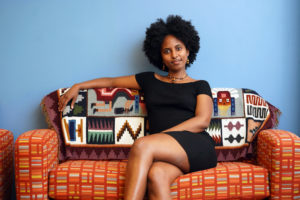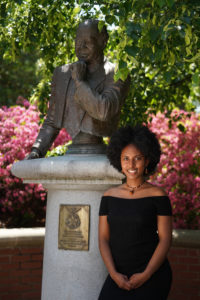It was a hot August day when Milen Mehari wound her way through a maze of tables and tents. The Asian Student Association and the Belly Dance Team had set up on Ball Circle. So had the Campus Christian Community and Students Helping Honduras. But nowhere at Club Carnival, a showcase of UMW’s more than 100 student organizations, could Mehari find the one at the top of the list she held in her hand – the African Student Union.

That’s because, she finally learned, the once-active group had dissolved. And that wasn’t OK with Mehari. She made a college career-changing move right then and there. A freshman who’d lived in her Virginia Hall room for less than a week, she agreed to become president and revive the group.
Back on Ball Circle Saturday, at the opposite end of her Mary Washington journey, Mehari will receive the bachelor’s degree in English, and women’s and gender studies, she spent four years earning. But she’s perhaps just as proud of what she’s leaving behind. With her passion – and poetry – she’s breathed life into the African Student Union she’s about to turn over to someone else. Working closely with the James Farmer Multicultural Center, she’s made it her mission – as has UMW President Troy Paino – to build up the culture of diversity on campus, for UMW students who look like she does … and for those who don’t.
“When we say multiculturalism, it does not simply mean black and brown and marginalized,” said Mehari, who plans to pursue a Ph.D. in Africana studies after a year with AmeriCorps. “I believe there’s a space for all of us to exist.”

Mehari, who goes by “Mili,” was in third grade when her family moved to Arlington, Virginia, from Eritrea, where both parents were active members of the east African country’s liberation efforts. They spoke Tigrinya, worked two jobs each and expected their daughter to go to college. Her cousin had studied at Mary Washington, so Mehari came with her mother to visit.
“It was very beautiful,” she said. “It moved me.” She didn’t tour anywhere else.
She hit the ground running, landing a freshman-year internship with the Institute for Policy Studies in Washington, D.C. There, she researched the criminalization of race and poverty – unfair targeting of marginalized populations by law enforcement – and how it led to disproportionate discipline in local schools. She dug into the concept of restorative justice – making things right through conversation and accountability, rather than punitive measures – and caught the attention of the local newspaper.
Because of her upbringing, she told The Free Lance-Star in a 2016 article that cited her studies, “I don’t have an option not to be great. I think that helped me to ignore the reality of what was going on. Now I can see this data … it’s significant.”
She continued that research during an internship with Fredericksburg’s Optimal Health Enterprise, bringing a workshop on restorative justice to UMW in 2018.
“More than any other student I’ve encountered, she understands what her purpose was on this campus,” James Farmer Multicultural Assistant Director Chris Williams said of Mehari. They’ve worked together to bring Mary Washington powerful events, including an eye-opening fall break trip to Selma, Alabama, and the Social Justice and Leadership Summit, about which they presented at an Atlanta conference.
“Her ability to bridge gaps between faculty, staff and students is outstanding,” said James Farmer Postdoctoral Fellow in Civil Rights and Social Justice LaWanda Simpkins, who also presented. “She pushed me to operate in my truth by simply operating in hers.”


Nothing brings out Mehari’s truth like her poetry. Vice president of UMW’s Political Poets Collective, her work was published last winter in the Oakland Arts Review. In Unruly, she uses her interaction with her own African hair – from feeling compelled to iron it flat to letting it fly – as a metaphor for the journey from oppression to empowerment.
She’s written poignant pieces for The Blue & Gray Press, been a RISE peer mentor, organized large-scale events like Colors of Africa and Resistance Through Poetry for Black History Month, and managed to minor in digital studies. Plus, she’sa tele-ambassador for the admissions office, inviting prospective students to visit a UMW she feels she helped shape.
She’s “a force of nature,” Digital Knowledge Center Director Martha Burtis said of Mehari, who, as a Domain Fellow, supported Mary Washington’s Domain of One’s Own, which provides personal online space for all students. Burtis collaborated with Mehari, too, as advisor for one of herfiveindependent studies. “Resisting Black Erasure” aims to capture narratives of black students through photos and video.
“Portraits of them to be celebrated, to be awed at,” Mehari said. “How beautiful would it be to read about a black girl who went to UMW and did what I did?”


